|
|
|
Sort Order |
|
|
|
Items / Page
|
|
|
|
|
|
|
| Srl | Item |
| 1 |
ID:
176500
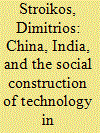

|
|
|
|
|
| Summary/Abstract |
In recent years, there has been a growing scholarly interest in how International Relations theory can contribute to our understanding of the impact of technology on global politics, underpinned mainly by an engagement with Science and Technology Studies (STS). However, less attention has been paid to the ways in which international society shapes technology. Building on sociological and historical studies of science and technology, this article outlines one way through which international society has constituted technology by developing a synthetic account of the emergence of technological advancement as a ‘standard of civilisation’ in the nineteenth century that differentiated the ‘society of civilised states’ from non-European societies, with a particular focus on China and India. In doing so, this article also highlights how this process has had a powerful and enduring influence on Chinese and Indian conceptions about science and technology. Thus, by shifting the focus from how technology shapes global politics to how international society shapes technology, this article provides new insights into the relationship between technology, power, and modernity in an interdisciplinary context. It also offers a new way of thinking about the complex dynamics of today's global politics of technology.
|
|
|
|
|
|
|
|
|
|
|
|
|
|
|
|
| 2 |
ID:
176496
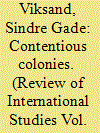

|
|
|
|
|
| Summary/Abstract |
While structural models of empire have recently re-emerged in the theoretical debates in the field of International Relations, a lack of attention has been paid to peripheral actors therein. This is particularly true for the analysis of the peripheries’ relations with polities outside the imperial structure of which the peripheries are a part. In this article, I build a framework to better understand how these extra-imperial ties are translated into peripheral positional power. This framework is constructed on the basis of three core arguments. First, to theorise peripheral power, peripheries need to be positioned in networks outside the imperial structure. Second, the positional power of peripheries depends on the quality of the ties they have to external actors. Peripheries with dense and exclusive ties to external actors are more powerful than those with only sparse and non-exclusive ties. Third, from the different combinations of density and exclusivity arise not only variations in positional power, but also the likely strategies that are engaged in forming alliances with external actors. These logics are illustrated through the study of two cases of the diplomacy of decolonisation: the American Revolutionary War and the Angolan War of Independence.
|
|
|
|
|
|
|
|
|
|
|
|
|
|
|
|
| 3 |
ID:
176493
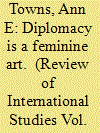

|
|
|
|
|
| Summary/Abstract |
The aim of this article is to examine whether and how diplomacy may be gendered, symbolically and rhetorically, using US representations of diplomacy as a case. Prior scholarship on gender and contemporary diplomacy is sparse but has shown that the symbolic figure of ‘the diplomat’ has come to overlap tightly with ‘man’ and be associated with traits often attributed to masculinity. Inspired by queer international relations methods, relying on the concept of ‘figuration’ and focused on US news media and biographies of diplomats from the past decade, this article uncovers and examines a palette of feminised figurations also at play in US representations of diplomacy, including the diplomat as ‘the “soft” non-fighter’, ‘the relationship builder’, ‘the gossip’, ‘the cookie-pusher’, and ‘the fancy Frenchman’. These feminised figurations alternate between configuring the diplomat as a woman and – more commonly – a (feminised) man. The analysis complicates rather than displaces existing claims, highlighting the importance of attention to slippages and challenges to dominant masculinised subject positions.
|
|
|
|
|
|
|
|
|
|
|
|
|
|
|
|
| 4 |
ID:
176495


|
|
|
|
|
| Summary/Abstract |
Edward Snowden exposed the discrepancy between the official US defence discourse of liberal values in cyberspace and secret surveillance and cyber exploitation practices. Situated in the critical literature on security and surveillance, the article proposes that more attention needs to be paid to the constitutive role of transgressive practices for security communities. The article introduces a Lacanian strategy for studying transgression in the US cyber defence community. Through this strategy, a transgressive other – in this case, China in cyberspace – enters the fantasy of the US cyber defence community as the symptom that conceals more fundamental tensions in the US cyber defence. But the community's representation of China in cyberspace represents more than that; China is a fantasmatic object that structures and gives content to a desire for transgressing the official ideals of the US cyber defence. This is why the excessive cyber practices that China is criticised for conducting mirror the secret, disavowed transgressions of the US cyber defence. Transgressions, the article concludes through Lacan, provide the necessary (partial) enjoyment that sustains the US cyber defence community as a solidarity-in-guilt and the official US cyber defence discourse.
|
|
|
|
|
|
|
|
|
|
|
|
|
|
|
|
| 5 |
ID:
176498
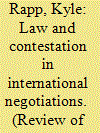

|
|
|
|
|
| Summary/Abstract |
What is the role of rhetoric and argumentation in international relations? Some argue that it is little more than ‘cheap talk’, while others say that it may play a role in persuasion or coordination. However, why states deploy certain arguments, and why these arguments succeed or fail, is less well understood. I argue that, in international negotiations, certain types of legal frames are particularly useful for creating winning arguments. When a state bases its arguments on constitutive legal claims, opponents are more likely to become trapped by the law: unable to develop sustainable rebuttals or advance their preferred policy. To evaluate this theory, I apply qualitative discourse analysis to the US arguments on the crime of aggression at the Kampala Review Conference of the International Criminal Court – where the US advanced numerous arguments intended to reshape the crime to align with US interests. The analysis supports the theoretical propositions – arguments framed on codified legal grounds had greater success, while arguments framed on more political grounds were less sustainable, failing to achieve the desired outcomes. These findings further develop our understanding of the use of international law in rhetoric, argumentation, and negotiation.
|
|
|
|
|
|
|
|
|
|
|
|
|
|
|
|
| 6 |
ID:
176497


|
|
|
|
|
| Summary/Abstract |
International migrants are subject to many types of violence, such as trafficking, detention, and forced labour. We need an improved understanding of what protects migrants from such violence. The concept of ‘migrant protection regimes’ draws our attention away from formal rights advocacy and to both the informal dimensions of protection and the way migrants help determine the quality of protection they receive. ‘Migrant protection regimes’ are sets of rules and practices regarding who ought to protect whom. These regimes include formal rights to protection in the law and informal relationships that protect migrants from lawful violence by the state. They may be changed by ‘power grabs’, when sovereign actors seek to monopolise protection relationships, but also by ‘exits’, when migrants refuse to accept the protection on offer. The study demonstrates the value of these concepts by using them to explain an unlikely case: a change in laws concerning migrant protection in an authoritarian state: Thailand. Drawing on rich qualitative sources, the article reveals how, after a human rights advocacy campaign had placed migrants’ protection in jeopardy, a mass migrant exodus compelled the country's junta to offer migrants protection on better terms.
|
|
|
|
|
|
|
|
|
|
|
|
|
|
|
|
| 7 |
ID:
176499
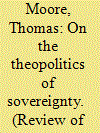

|
|
|
|
|
| Summary/Abstract |
This article considers how we can develop a reflexive reading of the theological contours of global politics through Carl Schmitt's account of sovereignty. In doing this it seeks to generate a critical architecture to understand the pluralistic registers of sovereignty within world politics. This article examines the theological dimensions of sovereignty, calling for a closer reading of the theopolitical discourses of legality and legitimacy at work within the largely secular discipline of International Relations. Tracing the pluralistic dimensions of sovereignty – juristic, popular, and theopolitical – allows us to see how sovereignty is operationalised through a range of distinct political registers. When the study of sovereignty is confused with questions of preference for modes of governing (whether secular, religious, democratic, and/or juristic) the complex historical sociology of sovereignty is overlooked. Contemporary scholarship in International Relations can benefit from closer engagement with the multiple, overlapping registers of sovereignty in global politics. We may disagree with Schmitt's reading of sovereignty as ‘theopolitics’ but there is real methodological value in engaging secular scholarship in thinking about religion as a constitutive domain for global order – alongside a rich range of critical approaches.
|
|
|
|
|
|
|
|
|
|
|
|
|
|
|
|
| 8 |
ID:
176494
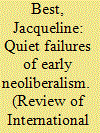

|
|
|
|
|
| Summary/Abstract |
While the last few decades of political economic history give the impression that the logic of neoliberalism is inexorable, this article argues that once we look further backwards and dig into recently declassified archives documenting the early days of neoliberal theory and practice, we find a messier picture. Economic policymakers in Thatcher and Reagan's administrations in the early 1980s did not set out to ‘fail forwards’ by generating a crisis that would enable a statist kind of neoliberalism. The key ideas that they drew on and the policies that they used to put them into practice sought to transform the economy indirectly, through a set of performative policy devices that they believed would generate a dramatic shift in people's inflationary expectations, lowering inflation without provoking a major recession. Archival records make it clear that these efforts were not only a failure, but also one that policymakers were acutely aware of at the time. By examining these quiet failures in economic policy, we can better understand how these governments simultaneously failed in their early efforts to introduce neoliberal economics and yet ultimately succeeded in transforming their economies in important respects – and in legitimising those transformations by narrating failure as a kind of inevitable success.
|
|
|
|
|
|
|
|
|
|
|
|
|
|
|
|
|
|
|
|
|